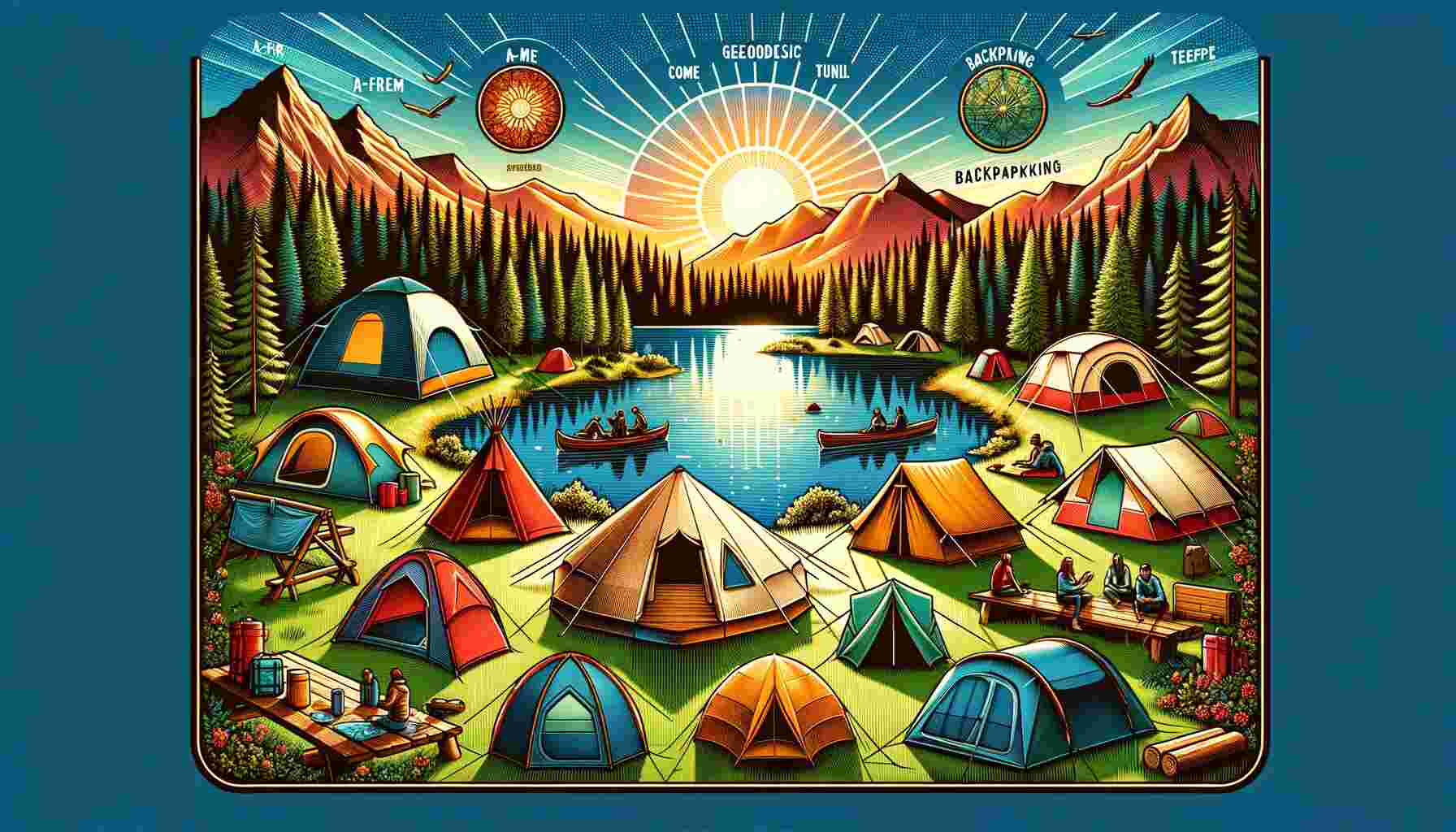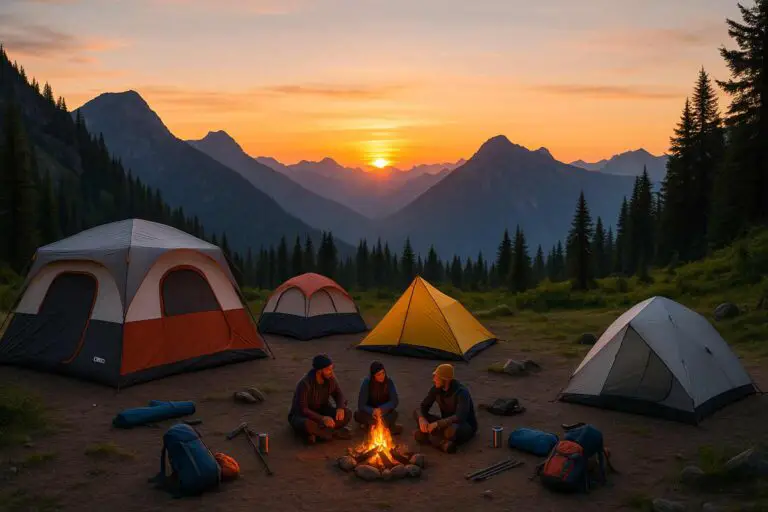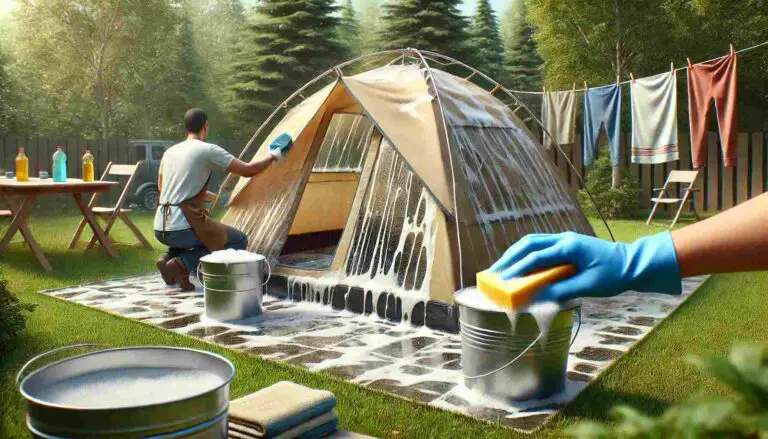Camping is an increasingly popular way to escape the hustle and bustle of everyday life and reconnect with nature. Whether you’re an experienced camper or a novice, selecting the right tent is crucial for a successful outdoor adventure. Tents come in various shapes, sizes, and designs, each offering distinct advantages and disadvantages.
This article provides a comprehensive comparative analysis of different tent types, highlighting their pros and cons to help you make an informed decision for your next camping trip.
1. A-Frame Tents
Overview
A-Frame tents, also known as ridge tents, are one of the oldest and most traditional types of tents. They have a simple design with a triangular shape, resembling the letter “A,” supported by a pole at each end and a ridgepole along the top.
Pros
- Ease of Setup: A-Frame tents are relatively easy to set up, especially for beginners. The straightforward design means fewer components to assemble.
- Lightweight: These tents are often lightweight and easy to carry, making them ideal for backpacking and hiking trips.
- Stable in Wind: The sloping sides of A-Frame tents offer good wind resistance, making them stable in windy conditions.
Cons
- Limited Space: The triangular shape results in limited interior space and headroom, which can be uncomfortable for taller individuals or when spending extended periods inside.
- Less Versatile: A-Frame tents typically offer less versatility in terms of features and configurations compared to modern tent designs.
- Ventilation Issues: The design can sometimes lead to poor ventilation, causing condensation build-up inside the tent.
Recommended Product: Eureka! Timberline SQ Outfitter 4 Tent
2. Dome Tents
Overview
Dome tents are among the most popular and widely used tent designs today. They feature a rounded, dome-like structure created by flexible poles that intersect at the top, creating a stable and spacious interior.
Pros
- Spacious Interior: The dome shape provides ample interior space and headroom, making it comfortable for campers to move around and store gear.
- Easy to Set Up: Most dome tents are designed for quick and straightforward setup, with color-coded poles and clips for added convenience.
- Versatile: Dome tents are available in various sizes and configurations, suitable for different camping needs, from solo trips to family outings.
Cons
- Less Wind Resistant: While dome tents are generally stable, they can be less resistant to strong winds compared to other designs, such as geodesic tents.
- Heavier: Larger dome tents can be relatively heavy, making them less ideal for backpacking or hiking where weight is a critical factor.
- Pole Breakage: The flexible poles used in dome tents can sometimes be prone to breakage, particularly in extreme weather conditions.
Recommended Product: Coleman Sundome Tent
3. Geodesic Tents
Overview
Geodesic tents are an advanced version of dome tents, featuring a more complex pole structure that intersects multiple times, creating a highly stable and durable design.
Pros
- Superior Stability: The multiple pole intersections provide exceptional stability, making geodesic tents ideal for harsh weather conditions, including strong winds and heavy snow.
- Durable: Geodesic tents are built to withstand extreme environments, making them a popular choice for mountaineering and expedition camping.
- Spacious: Like dome tents, geodesic tents offer a spacious interior with good headroom and storage options.
Cons
- Complex Setup: The intricate pole structure can make setup more time-consuming and challenging, especially for inexperienced campers.
- Expensive: Geodesic tents are often more expensive due to their advanced design and materials, which may not be suitable for budget-conscious campers.
- Heavier: These tents tend to be heavier than simpler designs, which can be a drawback for those looking to minimize their pack weight.
Recommended Product: The North Face VE 25 Tent
4. Tunnel Tents
Overview
Tunnel tents feature a series of parallel arches that create a tunnel-like structure. They offer a good balance of space, stability, and ease of setup.
Pros
- Spacious and Comfortable: Tunnel tents provide a large interior space and excellent headroom, making them comfortable for families and groups.
- Good Wind Resistance: The aerodynamic shape offers good wind resistance, especially when the tent is pitched with the narrow end facing the wind.
- Easy to Set Up: Tunnel tents are relatively easy to set up, with a straightforward pole structure that doesn’t require complex assembly.
Cons
- Requires Proper Pitching: Tunnel tents need to be properly pitched to ensure stability, which can be challenging in rocky or uneven terrain.
- Limited Freestanding Capability: Unlike dome or geodesic tents, tunnel tents are not freestanding and require stakes and guylines to maintain their shape.
- Heavier: These tents can be heavier than other designs, particularly larger models with multiple rooms and features.
Recommended Product: Vango Odyssey Air 500 Villa Tent
5. Pop-Up Tents
Overview
Pop-up tents are designed for quick and effortless setup. They typically feature a flexible frame that “pops” into shape when removed from its carrying bag.
Pros
- Instant Setup: The main advantage of pop-up tents is their instant setup. They can be set up in seconds, making them ideal for festivals, beach trips, and casual camping.
- Lightweight and Portable: Pop-up tents are usually lightweight and compact, making them easy to carry and transport.
- Convenient: These tents are highly convenient for short trips and situations where time and ease of setup are essential.
Cons
- Limited Durability: Pop-up tents are generally not as durable as other types and may not withstand harsh weather conditions.
- Less Stable: The flexible frame can be less stable in strong winds, making pop-up tents more suitable for calm weather and sheltered locations.
- Limited Features: Pop-up tents often lack the advanced features and configurations available in other tent designs.
Recommended Product: Quechua Waterproof Pop-Up Camping Tent
6. Cabin Tents
Overview
Cabin tents are designed to mimic the shape and structure of a cabin, with vertical walls and a high ceiling, providing a spacious and comfortable interior.
Pros
- Ample Space: Cabin tents offer plenty of interior space, with vertical walls providing maximum headroom and making it easy to move around and set up furniture.
- Family-Friendly: These tents are ideal for families and large groups, often featuring multiple rooms and partitions for privacy.
- Comfortable: The spacious design makes cabin tents comfortable for extended camping trips, providing a home-like experience.
Cons
- Heavier and Bulkier: Cabin tents are typically heavier and bulkier than other types, making them less suitable for backpacking and hiking.
- Complex Setup: The large size and multiple components can make setup more complex and time-consuming.
- Less Wind Resistant: The vertical walls can catch the wind, making cabin tents less stable in windy conditions compared to other designs.
Recommended Product: CORE 9-Person Instant Cabin Tent
7. Backpacking Tents
Overview
Backpacking tents are designed for lightweight and compactness, making them ideal for hikers and backpackers who need to minimize their load.
Pros
- Lightweight: Backpacking tents are designed to be lightweight and easy to carry, perfect for long hikes and multi-day trips.
- Compact: These tents pack down small, making them easy to fit into a backpack along with other gear.
- Quick Setup: Many backpacking tents are designed for quick and easy setup, allowing hikers to spend more time on the trail and less time setting up camp.
Cons
- Limited Space: To save weight, backpacking tents often have a smaller interior space, which can be cramped for taller individuals or those with a lot of gear.
- Less Durable: Lightweight materials used in backpacking tents can be less durable and more prone to wear and tear.
- Fewer Features: Backpacking tents may lack some of the features and comfort of larger tents, focusing more on functionality and weight reduction.
Recommended Product: Big Agnes Copper Spur HV UL2 Tent
8. Teepee Tents
Overview
Teepee tents, inspired by traditional Native American designs, feature a conical shape with a single central pole and are known for their simplicity and spacious interior.
Pros
- Spacious Interior: The conical shape provides a spacious interior with a high peak, allowing for comfortable movement and gear storage.
- Unique Design: Teepee tents offer a unique and aesthetically pleasing design that stands out in any campsite.
- Good Ventilation: The tall peak and open design provide excellent ventilation, reducing condensation inside the tent.
Cons
- Single Pole Dependency: The structure relies on a single central pole, which can be a point of failure if damaged or not properly secured.
- Wind Stability: While teepee tents can handle wind reasonably well, the large surface area can make them less stable in very strong winds.
- Setup Complexity: Setting up a teepee tent can be more complex than other designs, requiring careful placement and securing of the central pole and guylines.
Recommended Product: OneTigris Smokey HUT Ultralight Hot Tent
Conclusion
Choosing the right tent for your camping adventure depends on various factors, including the type of camping, weather conditions, group size, and personal preferences. This comparative analysis of different tent types highlights the advantages and disadvantages of each, helping you make an informed decision that best suits your needs. Whether you prioritize ease of setup, weight, space, or durability, there is a tent out there that will provide the perfect shelter for your outdoor experiences.







